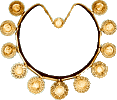Jewellery
Like other details of Roman life,
jewelry was at first restrained in design and sparingly used,
but later contributed to the general exuberant display. Women
wore large earrings and bracelets of various types: heavy gold
circlets, bangles of twisted gold "snake" bracelets, and some
of the same fashion with animal heads at the ends; and during
the later centuries they wore several bracelets on each arm..
 Jewelry, which earlier derived its beauty from intricately-fashioned yellow-gold, was later enameled or inlaid with bright colors and set with uncut, unfaceted precious stones. Jewelry, which earlier derived its beauty from intricately-fashioned yellow-gold, was later enameled or inlaid with bright colors and set with uncut, unfaceted precious stones.
The extravagant taste for ornament,
for earrings, bracelets, and finger-rings brought scathing
reprimands from contemporary writers. Pliny says, "They seek
for pearls at the bottom of the Red Sea, and search the bowels of the earth for emeralds
to decorate their ears." Seneca says that "a single pair
was worth the revenue of a large estate."
 Women throughout the period and men in
the latter part, had occasion for fibulae to fasten
the various outer draperies and, in the Greek manner, the
sleeves of stolas and tunicas. Women throughout the period and men in
the latter part, had occasion for fibulae to fasten
the various outer draperies and, in the Greek manner, the
sleeves of stolas and tunicas.
The fibula of the Republican resembled a
modern safety-pin, but in later centuries fibulae
more often
took the form of round or long brooches. Stickpins and
hairpins resembled those used by the Greeks.
Updated
|
